Opinion
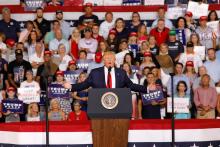
If we hear silence from white people of faith, we are in deep spiritual trouble. Christian moral objection to the president’s racist language must grow every day and from many quarters, but so farno word at all from the president’s most prominent evangelical supporters. Those Trump supporters have other issues and moral concerns, including differences with Democrats on abortion (as others of us do too); but will they call out the President on racism? That has now become an urgent moral and theological test.
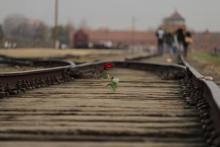
Though much of the trip was spent studying the past, at no point was the connection to present day more striking than when the group returned to their hotel after Auschwitz and turned on CNN. The news segment featured the detention centers along the U.S.-Mexico border and the deplorable conditions there.

How can someone who claims to stand on family values possibly support a policy of family separation that, in many cases, leaves no possibility for future reunification? How can someone who claims to follow a man who taught us to love our enemies possibly support an administration that refuses to provide children with basic necessities like soap, toothbrushes, or even a decent night’s sleep? It doesn’t add up, and it’s time Christians stood up and took notice because the religiously unaffiliated already have.

The president of the United States has recently unleashed a barrage of racist and anti-immigrant tweets that are, in my opinion, in perfect alignment with who we have known him to be. While outrage is the appropriate societal response to such childish and harmful behavior, I do not believe that focusing our attention on tweets and xenophobic rhetoric is what will move us forward as a nation. What will move us forward as a nation is for everyone in this country to begin to understand the role that race plays in our white-dominated society, and the many ways in which most of us are complicit with this system of domination.

In some ways, that conversation continues to change as we work through issues of inequality. In a world in which the U.S. women’s team wins the World Cup, we still fight for equal pay, for recognition. In the church, it’s a constant uphill battle to get people to respect women as much as men, and while the conversation makes a lot of people uncomfortable, we are still having it. I wouldn’t know how to begin these conversations if I hadn’t encountered the leadership of women in the church.
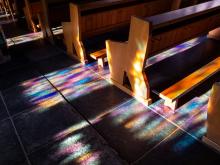
When I heard that Rev. Butler was appointed the first woman pastor of Riverside, I thought she broke the stained-glass ceiling. Instead, the church threw her off the stained-glass cliff. The phenomenon of the glass cliff is one documented throughout the working world. Women are invited into senior-level leadership only at times of crisis, when intractable problems, often caused by male predecessors, cannot be solved. There’s nothing to lose because things have hit rock bottom.

In the United States, we count drug overdoses per 100,000, not per million. The comparable numbers are 6 per million in Portugal, 21.3 per million for the European Union, and 217 per million in the United States.
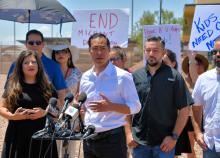
A Univision poll found that millennial (ages 18-33) Latinx voters believed that Julián Castro did the best among all presidential candidates in the first Democratic primary debate. This demographic is important because nearly half of all Latinx voters in the U.S. are millennials. Castro is connecting with this emerging generation because of his shared experiences and shared convictions.

Just under a hundred days before their first World Cup match (in which they would score a record-breaking 13 goals), every member of the team filed a class action, gender discrimination lawsuit against the U.S. Soccer Federation. The timing of the announcement conveyed that the 23 other teams in the tournament would not be the only opponents of the USWNT this World Cup.
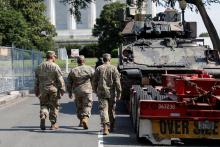
It didn’t start well — this American nation conceived in America’s original sin of racial dehumanization of Indigenous land theft and the slavery of Africans. Yet, many of the ideals that the nation’s founders aspired to still hold the potential to build a future nation much better than the one we began with. And that has been the struggle ever since.
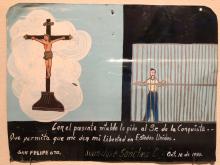
These retablos reflect on the faith that people had to begin the journey of migration, entering a foreign land. Often leaving family and home into the unknown, on a journey that is fraught with peril but also promise. Young fathers and mothers, children of families who will pray for them daily as they go. As the exhibit description mentioned, these retablos "depict a side of migration usually not told in statistical reports or even in detailed interviews of migrants."
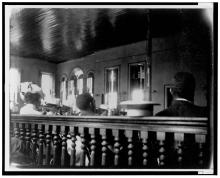
Because of this immense history, power, and influence despite generations of ill treatment and racism, black churches need to thrive, continuing to speak truth to power and serve black communities beyond the sanctuary.

As a white, suburban evangelical in the early 2000s, I grew up going on short-term mission trips every summer and participating in charitable missions during the school year. When I think back on it, I now see that these trips and the kinds of charity they encouraged began to fall out of favor around the mid 2000s, around the time that the grants from Bush’s faith-based office would have kicked in. Books like When Helping Hurts by Steve Corbett and Brian Fikkert, and Toxic Charity and its follow-up Charity Detox by Robert Lupton, exemplify the way that Christians on both the right and left would come to absorb the ideological imperatives of welfare reform.
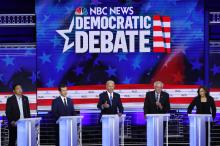
I watched both of the Democratic presidential debates over the last two nights, waiting to see if anything related to the invisibility of Indigenous peoples would somehow make its way into the conversation. I didn’t expect it to, of course; in a nation that does not even begin its events with a land acknowledgement (like Canada, Australia, and other nations do), why would we expect that the experiences of the original peoples of this land would come into a debate when each candidate only has a limited time to respond?
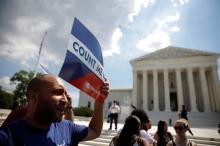
The right to be counted is at the foundation of our faith and our democracy. In Matthew 18:12–14) and Luke (Luke 15:3–7) Jesus tells the iconic parable about the lost sheep. A man, who owns 100 sheep, goes to great lengths to find one missing sheep out of the 100 and when he finally recovers the lost sheep, he is happier about the one sheep that is found than the 99 who are safe. The parable speaks volumes about the degree to which God shows a particular concern and attention around anyone who is lost or falls in harm way. In a similar vein, we should be alarmed and equally committed when one person is miscounted or disregarded in our society. Our democracy loses its integrity and legitimacy when people and communities are made invisible and further marginalized by undercounting in the census.

As a Palestinian Christian who grew up in Jerusalem, I have a hard time knowing where, if anywhere, my narrative fits among the pictures evangelical Christians paint of Israel. I was reminded of this recently when an acquaintance of mine did a “holy land tour,” and posted travel updates that showed up on my social media stream.

Public health professionals strive to bridge the gap between good intentions and good outcomes. Learning about public health will equip Christians to think on a systems level, to have evidence-based programs, champion accountability, and partner with people most affected to accomplish systemic change.
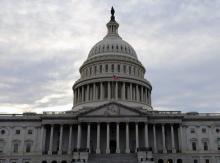
To mark the anniversary of Juneteenth, when enslaved people in Texas finally learned about the Emancipation Proclamation in June of 1865, the House Judiciary Committee held a special hearing on reparations for slavery this week. When asked about the idea of addressing the generational inequalities created by centuries of governmentally sanctioned white supremacy, Senate Majority Leader Mitch McConnell (R-Ky.) responded that America fought a civil war, passed landmark civil rights legislation and elected its first Black President to address the “original sin” of slavery. As far as he is concerned, the sins of the past can be forgotten.

We don’t know what disability justice is because we haven’t begun to reckon with our history of injustice.

In May, Gordon College announced it would no longer have a history major as a result of its restructuring. Two months earlier, Wheeling Jesuit University reduced their programs down to eight, eliminating non-professional programs and even theology. These are just two recent responses to the economic challenges currently facing nearly all Christian institutions of higher learning. Across the country, as small religious schools are in a struggle for survival, they are cutting programs and closing their doors. The distress beacon for Christian higher education is currently blinking.